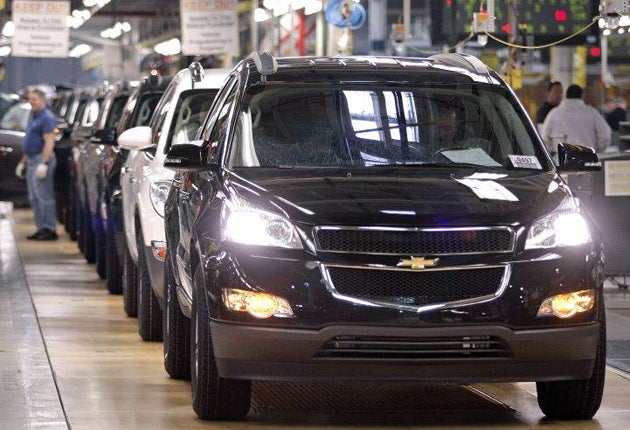David Prosser: GM may be back but the Chinese auto industry is now hogging the fast lane

Your support helps us to tell the story
From reproductive rights to climate change to Big Tech, The Independent is on the ground when the story is developing. Whether it's investigating the financials of Elon Musk's pro-Trump PAC or producing our latest documentary, 'The A Word', which shines a light on the American women fighting for reproductive rights, we know how important it is to parse out the facts from the messaging.
At such a critical moment in US history, we need reporters on the ground. Your donation allows us to keep sending journalists to speak to both sides of the story.
The Independent is trusted by Americans across the entire political spectrum. And unlike many other quality news outlets, we choose not to lock Americans out of our reporting and analysis with paywalls. We believe quality journalism should be available to everyone, paid for by those who can afford it.
Your support makes all the difference.Outlook The $20bn (£13bn) of proceeds from General Motors' return to the American stock market could rise as high as $23bn over the next few weeks, assuming various options are exercised. If so, GM will have struck a small victory for the US in the ongoing battle for economic bragging rights: earlier this year, the flotation of the Agricultural Bank of China broke the world record for an initial public offering (IPO), raising $22bn (the previous record holder being Visa, for its $19.6bn float a couple of years back). GM is set to grab it back.
So should we see this IPO as restoring a bit of pride to the US, which has in recent weeks been forced to defend itself against charges its $600bn return to quantitative easing is a ruthless exercise in currency manipulation? Well perhaps, but another aspect of the GM float is a much more revealing indicator of the shift in economic power from west to east.
It is that SAIC Motor Corp, the Chinese automotive company, contributed $500m to GM's IPO, buying a 1 per cent stake. The investment was not designed to be politically provocative, though there will no doubt be American politicians who resent the Chinese owning even a small chunk of a company that was nationalised and privatised at such huge expense to taxpayers. Rather, it reflects the close relationship between GM and SAIC, which is one of the big reasons GM is this year poised to post its first profit since 2004. Around a quarter of that profit will come from Shanghai GM, its Chinese operation, in which SAIC has a 51 per cent controlling stake.
Any automotive manufacturer with pretensions to compete on a global scale now has to take China seriously. Last year, for the first time, China was the world's largest car market: around 13 million passenger vehicles were sold in the country during 2009, compared with only 10 million in the US.
China also now holds the top ranking on car production, having overtaken both the US and Japan last year. Around half the cars it built were made by Chinese firms, rather than foreign operators with manufacturing sites in the country.
These are statistics for GM to reflect on as it returns to private ownership. For while this float is being hailed as something of a triumph for an auto giant that looked to be a basket case a year ago, even "new GM", stripped of all those painful liabilities, will never again dominate on the world stage.
Join our commenting forum
Join thought-provoking conversations, follow other Independent readers and see their replies
Comments